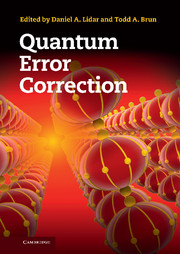Book contents
- Frontmatter
- Contents
- List of contributors
- Prologue
- Preface and guide to the reader
- Acknowledgements
- Part I Background
- Part II Generalized approaches to quantum error correction
- Part III Advanced quantum codes
- Part IV Advanced dynamical decoupling
- Part V Alternative quantum computation approaches
- Part VI Topological methods
- Part VII Applications and implementations
- Part VIII Critical evaluation of fault tolerance
- References
- Index
Prologue
Published online by Cambridge University Press: 05 September 2013
- Frontmatter
- Contents
- List of contributors
- Prologue
- Preface and guide to the reader
- Acknowledgements
- Part I Background
- Part II Generalized approaches to quantum error correction
- Part III Advanced quantum codes
- Part IV Advanced dynamical decoupling
- Part V Alternative quantum computation approaches
- Part VI Topological methods
- Part VII Applications and implementations
- Part VIII Critical evaluation of fault tolerance
- References
- Index
Summary
For most of human history we maneuvered our way through the world based on an intuitive understanding of physics, an understanding wired into our brains by millions of years of evolution and constantly bolstered by our everyday experience. This intuition has served us very well, and functions perfectly at the typical scales of human life – so perfectly, in fact, that we rarely even think about it. It took many centuries before anyone even tried to formulate this understanding; centuries more before the slightest evidence suggested that these assumptions might not always hold. When the twin revolutions of relativity and quantum mechanics overturned twentieth-century physics, they also overturned this intuitive notion of the world.
In spite of this, the direct effect at the human scale has been small. Our cars do not run on Szilard engines. Very few freeways, even in Los Angeles, have signs saying “Speed Limit 300,000 km/s.” And human intuition remains rooted in its evolutionary origins. It takes years of training for scientists to learn the habits of thought appropriate to quantum mechanics; and even then, surprises still come along in the areas we think we understand the best.
Technology has transformed how we live our lives. Computers and communications depend on the amazingly rapid developments of electronics, which in turn derive from our understanding of quantum mechanics: we use the microscopic movements of electrons in solids to do work and play games; pulses of coherent light in optical fibers tie the world together.
- Type
- Chapter
- Information
- Quantum Error Correction , pp. xv - xviiiPublisher: Cambridge University PressPrint publication year: 2013

